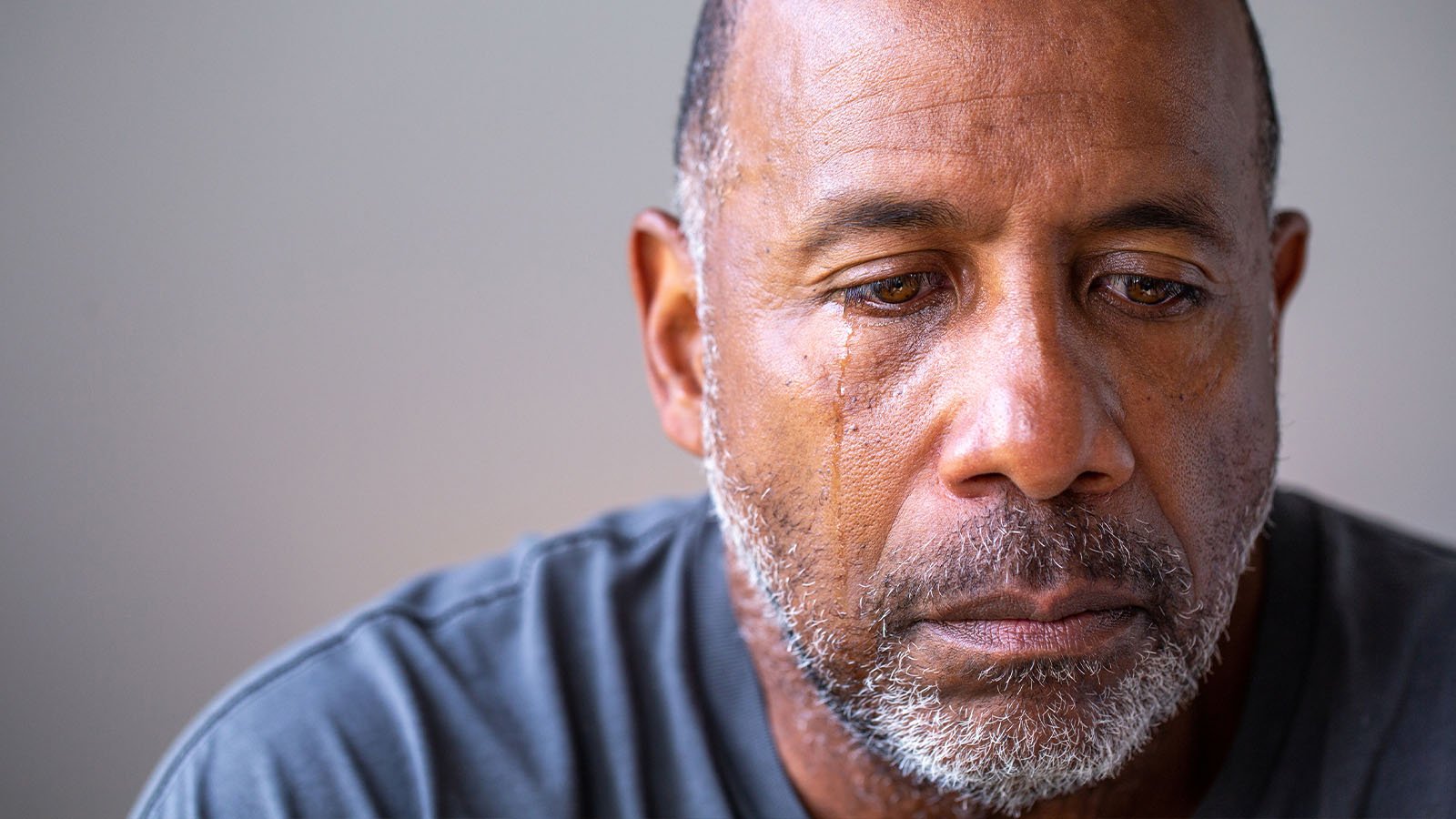Understanding your emotions after loss

It had been a month since Bill’s wife died of cancer. A few friends invited him to join them for a board game night. Though he began with a bit of nervous anxiety, within moments Bill found himself laughing and cutting jokes as he used to. He hadn’t felt this jovial in months. But, then, suddenly he was sobbing, overwhelmed with sadness. Bill was frustrated by all of these unpredictable emotions.
Bill’s experience may be familiar to you, as his experience is quite normal. Counselor Sabrina Black tells us:
It’s normal to feel like you’re going crazy when you lose a spouse, because your world is turned upside down. You may think, ‘I’m sad today. I just can’t stop crying. And then today I’m laughing and thinking about memories of great things that we’ve done together.’ It may not even be from day to day. It may be within the same hour or the same 5, 10 minutes. It’s normal to feel like all of a sudden you don’t know what’s going on, because your emotions are raging.
It can be helpful to know some common emotions you might experience in your daily life as you walk through this journey of healing.
What are common emotions when we experience loss?
Sometimes people equate sadness and grief in their minds. But grief includes far more than sadness. It is a holistic mental, emotional, physical, and spiritual response to a significant loss. There are many emotions that you might feel as you cope with grief. Anger (both rage and resentment), regret, fear, anxiety, and loneliness are common. In this article, we will explore these common feelings of grief.
Anger
After Robert’s wife passed away, anger permeated everything:
The anger that I’ve been dealing with isn’t necessarily always at other people; it’s more about this whole situation of her passing. There are so many branches to it—the anger of not being able to go on the trips we planned, the anger of our lives being disrupted, and the anger at how I’m starting to feel about myself.
Anger is triggered in situations that we feel are unjust or unfair and that challenge the way we think the world should operate. Death can be such a circumstance. Anger is a powerful yet complicated emotion. Positively, it can energize us to make needed change, but when out of control, it can negatively impact everything around us.
Out-of-control anger can show itself in rage or resentment. When Clay’s friend and mentor was murdered while leading a Bible study, his anger turned into rage. Perhaps you can identify with his experience:
My anger was raw. I wanted to harm the individual who killed my two friends. This was a deep hurt for me and I allowed myself to experience that and see my anger shift over to rage. And I felt myself burning out of control like a wildfire I couldn’t contain. Rage towards this was consuming me.
Clay’s anger was easy to detect. But a more subtle form of anger, which is called resentment or bitterness, can be just as dangerous. Pastor Doug Schimdt warns: “Bitterness festers within us. It gets projected onto people who care about us.” Robert, who was mentioned earlier, said, “When I’d come in contact with other people, I’d give short, curt responses, not realizing they were trying to help, even if they didn’t understand what I was going through.”
In anger we typically seek to assign blame to someone. This means that your anger might be directed toward God, toward yourself, toward others, or even toward the person who has died. If you are experiencing anger and need help resolving it, consider a few of these articles for help:
- Anger Toward Your Deceased Spouse
- Anger at Yourself After Your Spouse Dies
- Anger at God After your Spouse Dies
Regret
When grieving the loss of a loved one, it’s not unusual to feel waves of regret. To regret something is to wish that it had never happened. It is an emotional response where you feel remorse for something you’ve done or sorrow for something you were unable to do. According to Ron, it’s one of the more difficult parts of grief. He says,
One of the darkest, hardest parts of grief is regrets—the things you wish you had done or hadn’t done. I would often tell my wife, “Honey, I love to put a smile on your face. I wish I always had.” But there were times I made her cry because of what I did or how I was.
Regret might come as “should haves” or “what ifs” that seem to play on a loop in your mind. Maybe you’re reliving specific moments, wondering why you didn’t do things differently. Regret can feel overwhelming and can make you feel stuck. The first step in dealing with these feelings is understanding where they come from.
Regret is often just another word for guilt and shame. This experience of guilt and shame occurs when you violate a personal standard—a standard that often is reinforced by your friends and family members. It can attach itself to specific memories, like an unanswered phone call, a missed visit, or a decision you wish you could change. Dealing with regrets, then, will involve looking at the standard by which you are judging your actions. That can be difficult, but ultimately it can clarify personal responsibilities. And that lifts an unnecessary burden as you are processing your grief.
If you’re experiencing regret, check out:
- Coping with Regret After Loss
Fear & worry
In the early stages of grief we are especially vulnerable—and fear is our response to perceived threats. So then, fear can protect us from jumping into a dangerous situation. But fear can also get out of control.
When fear is fixed on the future—what might happen tomorrow or next week or next year—you’ve drifted into worry or anxiety. Whereas regret asks “what if” questions about the past, worry asks those questions about the future. Perhaps you can relate to Clarissa, who shares:
After my husband died, I became hypervigilant, afraid that the next tragedy was just around the corner. I worried constantly about my health, my children’s safety, and our financial future. Every little thing felt like a potential disaster—if my kids went on a trip, I feared they wouldn’t come back. The fear and anxiety were relentless, making it hard to trust that anything would be okay again.
Her husband’s death made Clarissa believe that the world wasn’t nearly as safe as she had assumed. She said, “Grief opened my eyes to all the ways that the world can be hard and dangerous.” This brought a flood of anxious feelings into her daily life that began to overwhelm her.
Part of fear’s role is to lead us to the God who is in control. That means we can move from worry and anxiety to a calm trust. Instead of dwelling on “what ifs,” we can shift our focus to the certainty of God’s promises, presenting our concerns in prayer and focusing upon what He says is true. Though it may be difficult to see God at work now, over time we begin to see a pattern of God’s faithfulness to us.
Loneliness
Nothing can prepare you for the feeling of loneliness you experience that first night in an empty bed. Or for the first Christmas without a parent. Empty chairs can be devastating. That is what Luevenia experienced after her husband passed away. She said, “There’s no way I’ll ever be the same. It just can’t be. I’m so lonely. The evenings are the toughest because I can get out during the day and do things.”
You may even experience the conflict of wanting to be alone and yet simultaneously longing to be around others. Or you might be physically around people and yet still feel lonely. Such experiences are all a normal part of having lost someone. Like the other emotions associated with grief, loneliness can be accompanied by unhealthy temptations.
One of the temptations associated with loneliness is to numb the feeling. Abusing alcohol or drugs is an unhealthy way people might try to numb the pain. Another temptation is isolation. After witnessing the accident that took his friend’s life, Mike tried both numbing and isolation. He shared:
I turned to alcohol to ease the pain. I’ve been a Christian all my life, but after this traumatic event, I still went to church, but I even pushed God away. I went to church, but I didn’t go to God. I chose isolation. I withdrew from my friends and I suffered alone for almost nine years.
With prolonged grief and the loneliness it brings, you might drift into hopelessness, which can lead to depression or suicidal thoughts. If this is you, to find help and support, contact your physician or pastor, or call the Suicide & Crisis Lifeline using the digits 9-8-8. Even if it doesn’t feel like it, there is always hope.
Why is it important to address these emotions?
Have you ever tried wrapping duct tape around a leaky pipe? It works for a little while, but eventually the pressure builds and the water finds a way to burst out, often causing more damage than before. In the same way, if we don’t address our emotions, they’ll eventually come out in unhelpful ways.
Annette, who lost her mother, says of grief, “Embrace it. Because you have to go through it, because you’ve loved and now that person is gone.” Similarly, GriefShare expert Joni Eareckson Tada, who is a quadriplegic, says,
It’s like a life-altering disability. You wake up in the morning and it’s there. And so you deal with grief, like you deal with a severe disability. You face the hard facts and then you just move forward and embrace it as part of life with all its brokenness and disappointment.
Thankfully, we do not have to face this alone. There is help for processing these emotions. By God’s design, this is facilitated in a supportive community. One grief support program that may help is GriefShare. GriefShare has guided thousands of grievers on their grief journeys, including those quoted throughout this article. To find a GriefShare group, either online or in person, go to griefshare.org.






